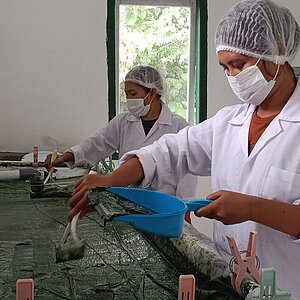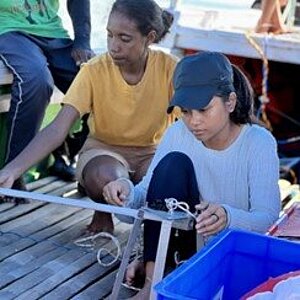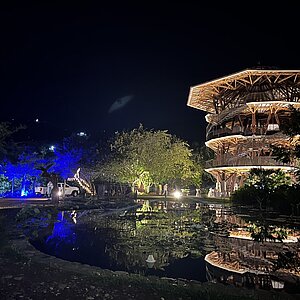Empowering coastal women for a sustainable future in India’s Dugong Conservation Reserve
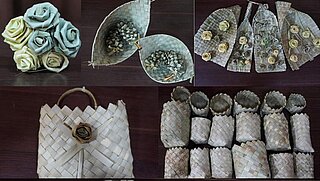
A unique training programme in Palk Bay is equipping women from local villages with skills to craft palmyra products, improving livelihoods and aligning economic development with nature-based solutions for dugong conservation and global climate goals.
In Palk Bay, Tamil Nadu, India, a transformative training programme is interweaving together local empowerment with nature-based solutions to global conservation challenges. Hosted by OMCAR (national partner) at the Palk Bay Centre, this initiative became a hub of creativity and empowerment in August 2024. The two-day Livelihood Enhancement - Palmyra Training programme aimed to equip 30 women from five coastal villages—Velivayal, Kollukadu, Pudhupattinam, Manora, and Adaikkathevan—with skills to craft sustainable products from locally sourced Palmyra leaves.
The initiative provides an alternative livelihood for the fishing community and is part of a sustainable business model aimed at reducing their over-reliance on ocean resources. Additionally, with the establishment of the dugong reserve in the region, the fishing community lost access to their traditional fishing grounds, making it even more crucial to provide them with sustainable income opportunities to support their livelihoods and conserve marine biodiversity.

The training is part of the IKI-funded Seagrass Ecosystem Services Project, which aligns with several Sustainable Development Goals (SDGs) and is part of the larger initiative implemented by the CMS Office in Abu Dhabi under the Dugong Memorandum of Understanding (MOU) in six countries across the Asia region, with local partner the OMCAR Foundation in India. By training women to create eco-friendly products, the programme supports SDG 12 (Responsible Consumption and Production) and SDG 5 (Gender Equality), promoting sustainable practices while empowering local women.
The Dugong Conservation Reserve, where the programme is based, is a globally significant marine habitat that supports a rich array of biodiversity, including seagrass meadows that are critical for the endangered dugong or “sea cow.” These seagrass ecosystems also play a critical role in blue carbon storage, helping to combat climate change and aligning with SDG 13 (Climate Action).
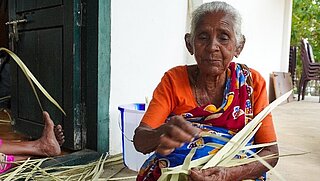
During the training, two professional trainers guided the women in the intricate processes of knitting and weaving palmyra leaves into a variety of products, such as nursery pots, pouches, small mats, and decorative items. The palmyra palm, an abundant and eco-friendly resource in Tamil Nadu, offers a sustainable alternative to synthetic materials, making it ideal for creating environmentally friendly products for local and regional markets.
As well as providing new economic opportunities, this initiative links local communities to wider conservation goals. By using Palmyra leaves, a resource closely tied to the local landscape, the programme promotes sustainable practices that help preserve the Dugong Conservation Reserve, while providing a pathway to economic self-sufficiency for coastal women.
The training concluded with an exhibition of the newly crafted items, showcasing the creativity and potential of these women as they take their first steps towards building sustainable businesses. This initiative demonstrates how empowering local communities can have a ripple effect, supporting both people and the planet through a unique blend of conservation and livelihood.
By combining economic development with nature-based solutions, the programme demonstrates how local action can drive global impact. As these women build their businesses, they are playing a crucial role in linking local craftsmanship with global conservation and climate action efforts, proving that community-driven projects can make a significant difference for both people and the planet.
The link has been copied to the clipboard
Contact
IKI Office
Zukunft – Umwelt – Gesellschaft (ZUG) gGmbH
Stresemannstraße 69-71
10963 Berlin








